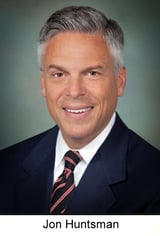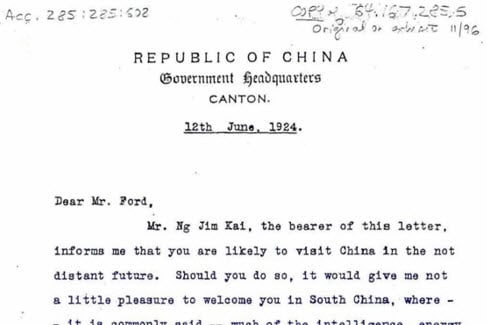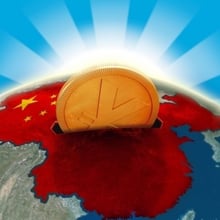-
Huntsman Revisited: Play “the Long Game” in China
By Margaret Speich April 20, 2016- Tweet
Despite a slowdown of U.S. dairy exports to China, there are four significant reasons for optimism, the former ambassador told USDEC members attending the April board meeting.
 Speaking at the U.S. Dairy Export Council’s Board of Directors meeting in April, Jon Huntsman told a personal story illustrating his recommended strategy for exporting to China.
Speaking at the U.S. Dairy Export Council’s Board of Directors meeting in April, Jon Huntsman told a personal story illustrating his recommended strategy for exporting to China.It was 2012 when Huntsman visited the corporate headquarters of Ford Motor Company in Dearborn, Michigan. He met with Ford CEO Alan Mulally, who was trying to convince Huntsman to join Ford’s Board of Directors.
“Boy, did we screw up,” Mulally told Huntsman, a former U.S. ambassador to China under George W. Bush. “We have to rethink our strategy totally as it relates to China.”
Mulally handed Huntsman a letter dated June 12, 1924. It was addressed to Henry Ford, from Sun Yat-sen, commonly referred to as “the father of modern China.”

“I know and I have read of your remarkable work in America,” the letter said. “And I think that you can do similar work in China on a much vaster and more significant scale. In a sense it may be said that your work in America has been more individual and personal, whereas here in China you would have an opportunity to express and embody your mind and ideals in the enduring form of a new industrial system.”
In other words, the father of modern China invited Ford Motor Company to help build the automotive industry in China.
Henry Ford didn’t send a personal reply. Instead he had his secretary type the Chinese leader a letter now on display at The Henry Ford Museum and Village. “Thank you for the kind invitation,” the letter says, but “Mr. Ford has made no plans for visiting China in the very near future.”
Huntsman said U.S. dairy exporters should learn from Ford’s strategic mistake: To succeed as an exporter to China, you must play “the long game” with patience and persistence.
 “We could have owned the Chinese auto sector if we played our cards right,” the Ford CEO explained, according to Huntsman's account. “We didn’t play the long game. We played the short game. We stuck with North America. We stuck with Europe which is now sucking wind with its auto sector. We did our thing in Latin America but we didn’t do Asia.”
“We could have owned the Chinese auto sector if we played our cards right,” the Ford CEO explained, according to Huntsman's account. “We didn’t play the long game. We played the short game. We stuck with North America. We stuck with Europe which is now sucking wind with its auto sector. We did our thing in Latin America but we didn’t do Asia.”Traditionally, USDEC board meetings showcase a keynote speaker with a big-picture message on globalization. This was Huntsman’s second such address in four years. Shortly after his Republican candidacy for president ended in 2012, Huntsman spoke at the Fall USDEC board meeting. He delivered a riveting keynoted address with the message that China was moving from the greatest export machine in the world to the greatest consumption machine in the world.
Revisiting in April, Huntsman faced an USDEC audience that had experienced a 2015 in which U.S. exports to China fell 35 percent by value compared to 2014. Thus far in 2016, exports to China are down another 17 percent year over year.
“The long game for you is going to be difficult when you are in an oversupply situation because it affects prices,” said Huntsman, who did join Ford’s board and now serves on its compensation, nominating and governance, and sustainability and innovation committees. “It kills you on margins. I know what you’re going through right now. But there are reasons to be optimistic about China.”
Huntsman listed four main reasons U.S. dairy exporters can be optimistic about China:
- Increasing personal income.
“China's personal income is projected to increase quite substantially and with it, dairy consumption,” Huntsman said. “By 2020, the models show that China will be at about per capita $12,000, up 7 or 8 percent from where it is today. Chinese President Xi Jinping has this great roadmap called the “Chinese Dream” (Zhongguo meng), and if you drive around China, you'll see these billboards everywhere that have these fancy, almost revolutionary-like depictions of people looking off admiringly into the distance at the future of China, the frontier society that he's trying to forecast.
“They have per capita income models that are based on key milestones of China's rise. So, 2020 would roughly be the 100-year anniversary of the Communist Party of China... They've got other models that take them through 2049, which is of course the 100-year anniversary of the People's Republic of China. By then, they want to advance per capita levels to a point that would suggest they are a developed country and no longer a developing country. Keep your eye on that. “
- Massive urbanization.
“This is a huge deal,” said Huntsman. “I witnessed President Obama's first trip to China when I was there as a U.S. envoy. In that meeting between President Obama and then Premier Wen Jiabao, President Obama was going on about the challenges in the United States, and what are we going to do about jobs, about the environment, about health care and things like that?
“The premier of China stops him in his tracks and says, `Mr. President, how would you like to have this as a challenge? How would you like to be a country of 800 million farmers and wake up to the fact, the reality that only need 200 million farmers in the future. I have 600 million redundant farmers on my hands, and I'm not quite sure what to do with them.’
“Consequently, you see people particularly from the agricultural sector moving in to Beijing, Tianjin, Shanghai, Guangzhuo, the big eastern cities that are 20 million people, going on 40 million people. Don't forget that the urban areas consume dairy at four times the rate of rural areas. We are seeing a massive shift in terms of populations.”
- Rapidly changing dietary habits.
“For those of us who have lived there and have been going back and forth consistently for decades, it's shocking the changes that are taking place,” said Huntsman. “You read the statistics. You know China has just replaced the United States as the world's largest ice cream market. Who would have guessed that happening? Soon it will be the largest pizza market. Things are changing at a very, very rapid pace.”
- The end of the government’s one-child policy.
The end of China's one-child policy was announced last fall and the Standing Committee of the National People's Congress gave final approval in late December. It opens up new possibilities for dairy exports to China—and offers hope to many people on a personal level. As Huntsman pointed out, “I'm the recipient of an adopted Chinese daughter who was abandoned at two months of age by her mother because of the one child-policy. I am assuming this was the reason but there is no way of knowing for sure. You can now have two children in China, which means there are 90 million couples who are now eligible for a second child. I don't need to tell you what the implications could be in terms of your products going forward. It's quite remarkable.”
Beyond these four reasons, Huntsman said his outlook is based on the progress he has witnessed as a keen observer of China.
“I am an optimist,” he said. “I've been watching China, living there, breathing the air for a good part of 35 years. The more I watch the more I see a step forward, a step back, two steps forward, a step-and-a-half back. But I am convinced that they are moving in a largely positive direction. We will all be frustrated and often times confused by things that are done, but inexorably, the movement is toward reform, toward opening and broadening the marketplace.
“I remember when nothing was accessible. I go back today as I was just last week meeting with our senior economic policy people, and I see the strides that are being taken. These are very complicated issues that their regime is dealing with. This isn't a traditional free-market regime, although they are becoming one, in a sense. Again, that’s why you have to play the long game.”
Learn More:
- More Babies in China More Customers for U.S. Dairy?
- Dairy Export Opportunities Series: China
- 5 Reasons U.S. Dairy Sales to China will Grow Long-Term
Photo of Sun Yat-sen letter: Henry Ford Museum
The U.S. Dairy Export Council fosters collaborative industry partnerships with processors, trading companies and others to enhance global demand for U.S. dairy products and ingredients. USDEC is primarily supported by Dairy Management Inc. through the dairy farmer checkoff. How to republish this post.
10 Most Recent Posts
Most Popular Posts in Past Year
Index of Posts by Topic
- #GotDairyJobs (4)
- About USDEC (67)
- Africa (6)
- Australia (4)
- Blog (8)
- Brazil (4)
- Canada (20)
- Central America (1)
- Cheese (58)
- Chile (1)
- China (54)
- Common food names (7)
- Company News (20)
- Consistent Supply (1)
- Crisis Management (3)
- Cuba (2)
- Dairy (6)
- Dairy checkoff (9)
- Dairy Ingredients (5)
- Dairy Management Inc. (2)
- Dairy Resources (1)
- Dairy Supply Chain (1)
- Dairy Trends (5)
- Documentation (3)
- EU (24)
- Experts on Dairy Exports (4)
- Exporter of the Year (2)
- Exports (24)
- Farmer leaders (1)
- Farming (38)
- Food Aid (8)
- Food Safety (8)
- Foodservice (3)
- Free trade agreements (34)
- Future trends (1)
- Geographical Indications (GIs) (10)
- Global Marketing (86)
- Global Shipping Crisis (1)
- Got Jobs? (9)
- Indonesia (1)
- Innovation (17)
- Japan (17)
- Krysta Harden (1)
- Market Access (25)
- Market Conditions (271)
- Member Services (17)
- Mexico (41)
- Middle East (9)
- Middle East & North Africa (3)
- Middle East/North Africa (9)
- Milk (4)
- Milk Protein Concentrate (MPC) (2)
- New Zealand (11)
- Next5% (20)
- Nonfat Dry Milk/Skim Milk Powder (8)
- Nutrition (19)
- Product Innovation (6)
- Protein (4)
- Regulations (5)
- Research & Data (329)
- Russia (3)
- Singapore (10)
- South America (8)
- South Korea (10)
- Southeast Asia (25)
- Strategic Insights (1)
- Supply (1)
- Sustainability (26)
- Technology (2)
- ThinkUSADairy (5)
- TPM23 (1)
- TPP (13)
- Traceability (8)
- Trade Barriers (5)
- Trade Data (7)
- Trade Policy (72)
- TTIP (5)
- UHT Milk (7)
- USMCA (2)
- Vietnam (4)
- Whey (6)
- Whey Ingredients (2)
- Whey products (10)
- Whole Milk Powder (WMP) (3)
- World Dairy Expo (1)
- World Milk Day (1)
- Yogurt (1)
Index of Posts by Date, Author
- June 2021 (13)
- March 2015 (12)
- September 2015 (12)
- April 2015 (11)
- December 2015 (11)
- March 2014 (10)
- February 2015 (10)
- October 2015 (10)
- October 2014 (9)
- June 2015 (9)
- July 2015 (9)
- November 2015 (9)
- March 2016 (9)
- October 2019 (9)
- September 2013 (8)
- May 2015 (8)
- August 2015 (8)
- January 2016 (8)
- February 2016 (8)
- March 2017 (8)
- December 2018 (8)
- May 2019 (8)
- December 2019 (8)
- June 2014 (7)
- November 2016 (7)
- May 2017 (7)
- May 2018 (7)
- July 2020 (7)
- June 2023 (7)
- July 2016 (6)
- August 2018 (6)
- October 2018 (6)
- November 2018 (6)
- February 2019 (6)
- June 2019 (6)
- August 2019 (6)
- March 2020 (6)
- April 2020 (6)
- June 2020 (6)
- June 2022 (6)
- February 2014 (5)
- June 2016 (5)
- August 2016 (5)
- September 2016 (5)
- December 2016 (5)
- February 2017 (5)
- July 2017 (5)
- October 2017 (5)
- January 2018 (5)
- April 2018 (5)
- June 2018 (5)
- July 2018 (5)
- September 2018 (5)
- January 2019 (5)
- March 2019 (5)
- April 2019 (5)
- July 2019 (5)
- September 2019 (5)
- November 2019 (5)
- January 2020 (5)
- August 2020 (5)
- October 2020 (5)
- April 2021 (5)
- January 2022 (5)
- May 2013 (4)
- September 2014 (4)
- April 2016 (4)
- May 2016 (4)
- October 2016 (4)
- January 2017 (4)
- April 2017 (4)
- June 2017 (4)
- August 2017 (4)
- September 2017 (4)
- December 2017 (4)
- February 2018 (4)
- February 2020 (4)
- May 2020 (4)
- February 2022 (4)
- September 2022 (4)
- April 2023 (4)
- December 2023 (4)
- November 2017 (3)
- March 2018 (3)
- September 2020 (3)
- December 2020 (3)
- February 2021 (3)
- May 2021 (3)
- August 2021 (3)
- December 2021 (3)
- March 2022 (3)
- April 2022 (3)
- May 2022 (3)
- October 2022 (3)
- December 2022 (3)
- May 2023 (3)
- July 2023 (3)
- November 2023 (3)
- January 2026 (3)
- March 2011 (2)
- June 2011 (2)
- September 2011 (2)
- March 2012 (2)
- June 2012 (2)
- July 2012 (2)
- March 2013 (2)
- July 2013 (2)
- November 2020 (2)
- January 2021 (2)
- March 2021 (2)
- July 2021 (2)
- September 2021 (2)
- October 2021 (2)
- November 2021 (2)
- July 2022 (2)
- August 2022 (2)
- January 2023 (2)
- March 2023 (2)
- October 2023 (2)
- January 2024 (2)
- February 2024 (2)
- April 2024 (2)
- June 2024 (2)
- July 2024 (2)
- November 2024 (2)
- December 2024 (2)
- February 2025 (2)
- June 2025 (2)
- July 2025 (2)
- September 2025 (2)
- November 2025 (2)
- December 2025 (2)
- January 2010 (1)
- February 2010 (1)
- March 2010 (1)
- April 2010 (1)
- May 2010 (1)
- June 2010 (1)
- July 2010 (1)
- August 2010 (1)
- September 2010 (1)
- October 2010 (1)
- November 2010 (1)
- December 2010 (1)
- January 2011 (1)
- February 2011 (1)
- April 2011 (1)
- May 2011 (1)
- July 2011 (1)
- August 2011 (1)
- October 2011 (1)
- November 2011 (1)
- December 2011 (1)
- January 2012 (1)
- February 2012 (1)
- April 2012 (1)
- August 2012 (1)
- September 2012 (1)
- October 2012 (1)
- November 2012 (1)
- December 2012 (1)
- January 2013 (1)
- February 2013 (1)
- April 2013 (1)
- June 2013 (1)
- August 2013 (1)
- October 2013 (1)
- November 2013 (1)
- December 2013 (1)
- January 2014 (1)
- April 2014 (1)
- May 2014 (1)
- November 2022 (1)
- February 2023 (1)
- August 2023 (1)
- September 2023 (1)
- March 2024 (1)
- May 2024 (1)
- August 2024 (1)
- September 2024 (1)
- October 2024 (1)
- January 2025 (1)
- March 2025 (1)
- April 2025 (1)
- May 2025 (1)
- August 2025 (1)
- February 2026 (1)
- USDEC (183)
- USDEC Staff (167)
- Alan Levitt (119)
- Tom Suber (41)
- Margaret Speich (22)
- Marc A.H. Beck (15)
- Vikki Nicholson-West (11)
- Angélique Hollister (11)
- Tom Vilsack (8)
- Jaime Castaneda (7)
- Matt McKnight (7)
- Véronique Lagrange (7)
- Margaret Speich and Mark O'Keefe (7)
- Ross Christieson (7)
- Paul Rogers (6)
- Shawna Morris (5)
- William Loux (5)
- Alan Levitt and Marc Beck (5)
- Krysta Harden (4)
- USDEC Communications (3)
- Kristi Saitama (3)
- Marilyn Hershey (3)
- Brad Gehrke (3)
- Tom Quaife (2)
- Nick Gardner (2)
- Jim Mulhern (2)
- Alan Levitt and William Loux (2)
- Kara McDonald (2)
- Luke Waring (2)
- Merle McNeil (2)
- Krysta Harden, USDEC President and CEO (2)
- Andrei Mikhalevsky (1)
- Rodrigo Fernandez (1)
- Dermot Carey (1)
- Jeremy Travis (1)
- Annie Bienvenue (1)
- Ross Christieson and Shawna Morris (1)
- Becky Nyman (1)
- Paul Rogers and Tom Quaife (1)
- Rick Ortman (1)
- Tony Rice (1)
- Barbara O’Brien (1)
- Paul Rogers and Mark O'Keefe (1)
- Dalilah Ghazalay (1)
- Amy Wagner (1)
- Mitchell Bowling (1)
- Erica Louder (1)
- Brad Scott (1)
- Amy Foor (1)
- Scott Lantz (1)
- Sandra Benson (1)
- Errico Auricchio (1)
- Jaclyn Krymowski (1)
.png)

